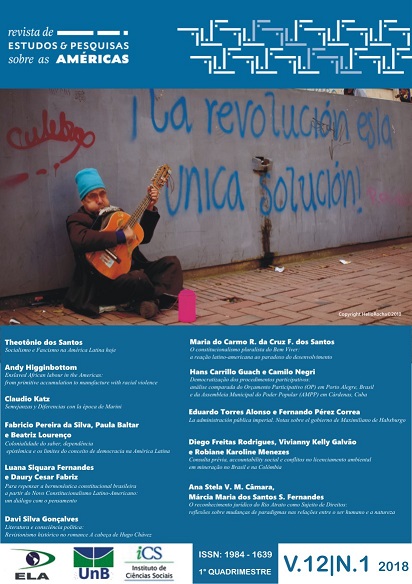Para Repensar a Hermenêutica Constitucional Brasileira a partir do Novo Constitucionalismo Latino-Americano: um diálogo com o pensamento decolonial
Keywords:
Direito; Direito ConstitucionalAbstract
O presente artigo analisa em que medida as ideias propagadas pelo novo constitucionalismo latino-americano, a partir de um diálogo com o pensamento decolonial, podem contribuir para se repensar a hermenêutica constitucional brasileira. Como ponto de partida, busca-se explicar o denominado pensamento decolonial, o qual apresenta-se como pano de fundo para se compreender esse novo constitucionalismo. Posteriormente, descreve-se sucintamente a forma como o novo constitucionalismo surgiu, bem como suas principais propostas. Por último, busca-se articular as contribuições do mesmo com a possibilidade de se repensar a hermenêutica constitucional brasileira. Este trabalho foi realizado a partir de uma revisão bibliográfica, por meio da aplicação do método dialético.
Palavras-chave: Pensamento decolonial; Constitucionalismo; Novo Constitucionalismo Latino-Americano; Hermenêutica constitucional brasileira.
Rethinking the Brazilian Constitutional Hermeneutics From the New Latin American Constitutionalism: a dialogue with the decolonial thought
Abstract
The present article analyses the extent to which the ideas, propagated by the new Latin-American constitutionalism, starting with a dialogue on decolonial thought, may contribute to the rethinking of the Brazilian constitutional Hermeneutic. Initially the purpose is to explain the denominated decolonial thought that presents itself as a background in order to understand this new constitutionalism. Subsequently it describes succinctly the way in which the new constitutionalism will emerge, as well as its principle proposals. Finally, it attempts to articulate its contributions with the option to rethink the Brazilian constitutional hermeneutics. This work was brought to fruition from a bibliographical revision, through the application of the dialectic method.
Keywords: Decolonial thinking; Constitutionalism; New Latin American Constitutionalism; Brazilian constitutional hermeneutics.
Para Repensar la Hermenéutica Constitucional Brasileña a partir del Nuevo Constitucionalismo Latino-Americano: un diálogo con el pensamiento decolonial
Resumen
Este artículo analiza en qué medida las ideas propuestas por el nuevo constitucionalismo latino-americano, a partir de un dialogo con el pensamiento decolonial, pueden contribuir a repensar la hermenéutica constitucional brasileña. Como punto de partida, tratamos de explicar el llamado pensamiento decolonial, que se presenta como un fondo para entender este nuevo constitucionalismo. Posteriormente, describimos brevemente cómo surgió el nuevo constitucionalismo, así como sus principales propuestas. Por último, se trata de articular las contribuciones de lo mismo con la posibilidad de repensar la hermenéutica constitucional brasileña. Este trabajo se realizó a partir de una revisión de la literatura, mediante la aplicación del método dialéctico.
Palabras-clave: Pensamiento decolonial; Constitucionalismo; Nuevo Constitucionalismo Latino-Americano; Hermenéutica constitucional brasileña.Downloads
Downloads
Published
How to Cite
Issue
Section
License
The published material is the property of the Journal, and may be reproduced in whole or in part with indication of the source.
Copyright: Authors will be responsible for obtaining the copyright of the material used. Authors who publish in this journal agree to the following terms:
a)Authors retain the copyright and grant the journal the right of first publication, with the work simultaneously licensed under
the Creative Commons Attribution License which allows the sharing of work with acknowledgment of authorship and initial publication in this journal.
b) Authors are authorized to take additional contracts separately, for non-exclusive distribution of the version of the work published in this journal (eg, publish in institutional repository or as a book chapter), with acknowledgment of authorship and initial publication in this journal.
c) Authors are allowed and encouraged to publish and distribute their work online (eg in institutional repositories or on their personal page) at any point before or during the editorial process, as this can generate productive changes as well as increase the impact and the citation of the published work (See The Effect of Free Access).
















